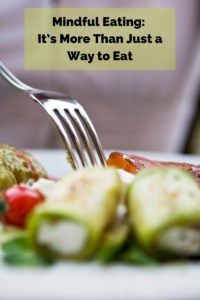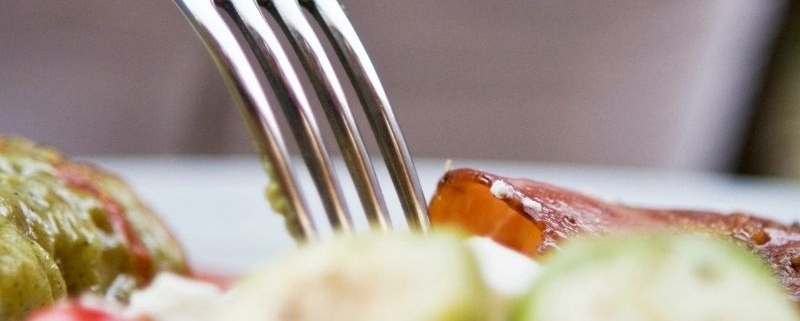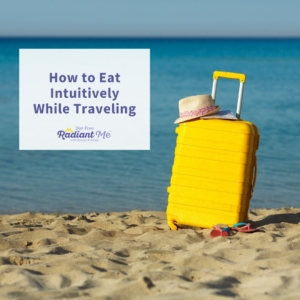Mindful Eating: It’s More Than Just a Way to Eat
 How familiar are you with the term “mindfulness”?
How familiar are you with the term “mindfulness”?
Mindfulness, and mindful eating, are terms that seems to be thrown around by many doctors, social media influencers and maybe even your friends these days!
But what exactly is mindful eating and where did it come from?
What is Mindful Eating?
Mindful eating is rooted in the Buddhist concept of mindfulness and is a form of meditation that helps you recognize and cope with emotions and physical sensations.
In order to properly shift into the mindset of mindful eating one must use, or adopt, the concept of mindfulness in order to reach a state of full attention to the eating experience, cravings, and physical hunger and fullness cues.
It can be more clearly defined as—paying attention to your eating experience by utilizing all of the 5 senses (seeing, tasting, hearing, smelling and feeling), while also observing and taking in the emotional and physical responses that take place before, during and after the eating experience.
Mindful eating is NOT a diet, or just a way to eat—but it is mindset. It has nothing to do with calories and macronutrients nor does it focus on weight loss. The intention is to help savor the eating experience and encourage full presence during a meal.
Mindful eating is process oriented verses outcome driven. It focuses on the journey, or process of the eating experience, which is better understood as process oriented. This is compared to dieting or following a meal plan which focuses on meeting objectives, or meeting a goal (realistic or not), also known as outcome driven.
The overall goal of mindful eating is to shift your focus away from thinking about food externally, or unconsciously, to exploring, enjoying and remaining present with food and the eating experience. It’s all about bringing awareness to each plate or bite of food.
Five Fundamental Concepts of Mindful Eating:
- Eat slowly with no distraction.
- Look inward to hear hunger/fullness signals.
- Learn to differentiate between the different types of hunger (biological hunger and emotional hunger) and act on those feelings appropriately.
- Consistently engage all five senses.
- Learn strategies to cope with any guilt, shame, anxiety (any negative feelings) around food and eating.
- Take stalk of how foods make you feel.
- Have a real appreciation for food and the eating experience.
Although these concepts may seem totally out of reach, mindful eating is something everyone can benefit from and get involved in!
The Benefits of Mindful Eating:
- Reduces stress
- Increases enjoyment and appreciation for eating and food.
- Improves digestion
- Aids in decreasing disordered eating behaviors (binge eating, emotional eating, etc.)
- Allows you to take charge of your food, instead of feeling that food “controls” you!
4 Ways to Get Started
- Prioritize mealtimes. Give yourself plenty of time to organize, prepare and eat your meals. Rushing mealtime can not only hinder your ability to hear what your body is telling you (i.e., hunger/fullness), but also doesn’t give you time to appreciate and be present with your meal. And plus—no one likes to be rushed!
- Check in & ask yourself questions. Don’t be afraid to set your fork aside and ask yourself—
- How am I feeling at this point in my meal?
- Are there feelings of pleasure, regret, stress, anxiety, disappointment?
- Are there any memories being brought up while I’m eating this meal?
- Where is my hunger/fullness level at?
- How is my body feeling right now?
- Use your five senses. As mentioned, mindful eating encourages to utilize your five senses.
- Before eating your meal, really look at your food. Take note of the color, the smell, the look, overall appeal, etc.
- During the meal, check in with the textures, tastes, temperatures, etc. What is sticking out to you? What do you like? What do you not like?
- After the meal, reflect on your experience. What do you like? What did you not like?
- Be aware of your desire or intention. Although this will take some practice, being able to identify your desire or intention for eating is very important. Believe it or not, there are many different types of hunger or reasons for eating! We eat because we are hungry (of course) but also when we feel happy, sad, bored, excited, anxious, nerves, and so much more! Try to identify your desire to eat and act on it appropriately.
Beware of The Mindful Eating Diet
Many people begin the process of mindful eating and turn it into another diet of rules. And when they “break” the rules, they spiral into the guilt-shame cycle. This is especially true of those who’ve dieted for quite some time. This is why it’s so important to shift out of the diet mentality and change your beliefs around food, eating and your body. Otherwise, a beautiful practice such as mindful eating, becomes yet another diet.
Need help breaking the spell of diets so you can truly enjoy mindful eating? Pop your name and email below and get started in my free 3 day break the spell of diets online experience.






